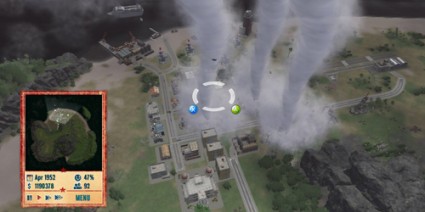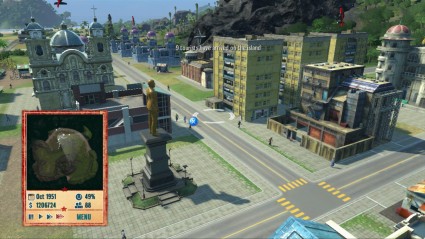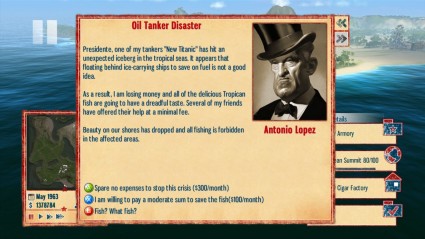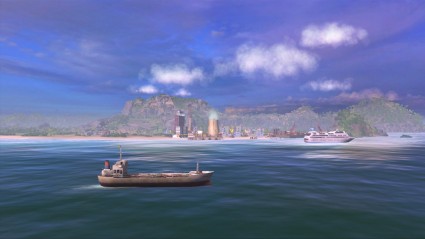Reviews
Review: Tropico 4
November 10, 2011, Author: Trent Pyro
If the recent revolution in Libya has taught us one thing, it’s that freedom and liberty are more than worth fighting for. As we watch millions of people brave gunfire and regime reprisals to make their voices heard, most of us are counting our blessings and feeling pretty lucky to live in a democratic nation.
Many of us even support our Arab neighbours; I myself give to the Red Cross and was pleased to hear that they got support to the Libyan rebels extremely quickly. What must it have been like for Gaddafi, watching his people rise up against him and take up arms to overthrow him? Can we possibly understand what that’s like?
Well, not really. None of us run a dictatorship, let alone one that has been active for 40 or so years. Yet many of us are fascinated by the prospect of running a country, and through many games over the years we’ve had our chance.
Now Kalypso Media and Haemimont Games have returned with the fourth iteration of their Tropico series, a game which lets you start your own little tropical paradise and attempt to lead it to prosperity. Having played Tropico 3 a lot and thoroughly enjoyed it, I jumped at the chance to see what improvements and innovations the new title brings.
Welcome to Tropico, El Presidente!
The basic premise of Tropico 4 is similar to many other simulation games. You start with an island and a few citizens and must build up industry and trade while keeping your people placated with entertainment and satisfying their food, healthcare and liberty needs.
The standard Campaign presents you with twenty or so scenarios, each with its own challenges. While they initially start as simply as ‘Keep your people fed and watered and try not to force them to revolution’, later stages throw trade disputes, natural disasters and social issues in the mix. Time advances as you go through the different challenges, taking you from the mid-sixties up to the present day and bringing some of the technology with it. Due to the ‘developing country’ style of Tropico you wont see skyscrapers and subway systems but there’s enough progression to keep you on your toes.
While there’s no precise plot, Tropico 4 sort of writes itself as you play. As with many freeform sim games, the choices you make illicit a reaction from your people and dealing with those reactions creates more reactions; the cycle continues as your forge your own path. As there’s an infinite number of ways to play I’ll just explain the basics of the game and any new features they’ve added, as well as throwing in a few of my own experiences.

You are essentially Fidel Castro...
Island life
Tropico 4 is an extremely complex game. Beneath its streamlined and user-friendly interface is a huge mountain of statistics and factors that denote a myriad of percentages and scores. Each one has a consequence and when it’s all happening at once it’s very easy to get overwhelmed. While the tutorial did a better job of easing you in than the previous game’s effort, I still felt like I’d been thrown in at the deep end.
Your people have five basic needs; food, faith, rest, entertainment and work. Each of their needs diminishes over time and when they get low enough the person will head off to satisfy themselves. Your job is to ensure they can do this. No farms means no food, no market means nowhere to distribute it. No jobs means no work, no churches means nowhere to pray and no houses means they’re homeless. So, I just build enough houses for everyone to live in, food for them to eat, a church and a pub and make some jobs right? Nope, that’s just the tip of the iceberg.
It’s essentially like managing hundreds of Sims; some are more bothered than others. Some people are quite content being miserable while others will rebel at the first whiff of upset. Alongside the basic needs of your people you’ll have to satisfy their liberty, safety, environment and a plethora of other opinions to keep them happy . Add to this the fact that most citizens will be part of a particular faction with its own demands and goals and it all gets incredibly complicated.
Thankfully the interface is not. It operates on a sort of depth system, although getting down to the nitty-gritty is a must if you want to succeed. On the top-level you build what the people need; tenements, schools, farms, clinics, wharfs, markets, etc. When you get more people through immigration or reproduction you build more stuff. Some of the factions have demands that can be placated by building certain structures or solving certain issues like pollution or open immigration and it’s relatively easy to placate them. Constructing and maintaining buildings is done through a simple radial menu, with overlays to show you prime building, farming and mining spots.
The chief way to make money in Tropico 4 is export. You can farm tobacco, sugar and coffee, which can’t be eaten or used by your people but sold for a high price at export. Mining serves the same purpose, allowing you to sell iron, bauxite and gold to foreign powers.
At the start of a scenario you’ll receive monetary aid from the US and USSR but once you have a solid export revenue stream you won’t need it. Building extra facilities like cigar factories and canneries allow you to manufacture products from raw materials and sell them for a higher price and securing some industry is essential in the later stages. Tourism is also a latter-stage option and Tropico 4 includes new attractions and hotels to make turning your island into a holiday resort a viable, albeit headache-inducing possibility.
The second level is accessed mainly through your many advisers and the new Ministry. Here, you can hire a cabinet of ministers who allow you to declare edicts that affect the way your island is run. Each one has a benefit and consequence and most cost money. An example would be the Conscription edict; Crime drops and your army grows, but Liberty also drops and you lose the respect of the Intellectual faction for the duration of the edict. It’s weighted moves like that which permeate every aspect of Tropico 4 and managing them is key to keeping the people happy and staving of rebellion or worse; the loss of an election!
The way you run your country and the sort of freedoms you give you people also affect this second tier of gameplay. Run a military dictatorship and crime won’t be much of an issue, production with remain steady and your island will most likely be quite profitable. Yet the people will be lacking in Liberty and some of them will get so fed up they’ll become rebels. These rebels can attack at any time and if you don’t have enough trained soldiers to fight them, they can kill you and take power!

Far superior visually to previous games in the series.
Similarly, diplomatic relations with the world superpowers are important and can reap benefits or spell imminent doom dependent on how you handle them. The US and USSR factions are a Tropico staple and are the main ones you need to worry about, but new to the fourth game are Europe, China and the Middle East; each bring their own demands and opportunities to your little nation.
Occasionally side missions will pop up around your island. These are tasks that are optional but rewarding and help to add a little structure to the game. Most of them involve building, producing, exporting or hiring a specific number of something (or someone) and the rewards can range from in-game money to a few quid in your Swiss Bank Account. This account is taken into consideration when your final game score is totted up and represents how much cash you have to fall back on if it all goes tits up.
The third and most fiddly tier is the careful balance and adjustment of every single aspect of your island. Accessed by hitting A over any building or X over any person, the Info Pane is your tool to fiddle with parameters that affect the running of each structure and section of industry. Housing can be made cheaper or more expensive, wages can be adjusted, new add-ons can be chosen to enhance certain buildings; the list is endless. Getting the operation of these tiny sliders just right is absolutely key to success. Make rent too high and people will live in shacks, angering them and drawing tuts from the world community. Make wages to high and you’ll spend more than you make, spiralling into debt and angering the people even more.
I take it back; the interface is just as complex as the game. Every single thing has numerous effects that then have to be adjusted and managed and it’s enough to make anyone go insane. In my first scenario I found it impossible to keep on top of everything and keep even half the population happy. They had food, shelter and jobs yet they were still miserable.
I had rebels within an hour and had to crush a military coup by tea time. I almost ran my treasury dry building power and radio stations, and newspaper offices to placate my people’s Liberty and they thank me by taking it all over and bashing me on the airwaves! I send in the army and now I’m a militant arsehole. More rebels, people start leaving Tropico.
America is angry because I’m oppressing my people, while the Middle East sends me a blueprint for a Weapons Factory so I can make them guns with my iron. It’s a fucking nightmare, made no better by the fact that everything takes so long to do! I get a shout that there’s not enough housing, so I place three new tenements. Yet before the lazy builders get done erecting them I’ve got the rebels attacking because of lack of housing! Can’t they see the bloody scaffolding?!
The problems don’t just stem from the complexity either. As in Tropico 3, fostering a solid military seems very difficult to do and there’s no clear instruction on how to do it. While you can’t invade other countries, having a good bunch of troops can help repel rebel attacks and keep dissidents in check.
As far as I understand, I had to build some guard posts for the soldiers to hang out in, then an army base for them to live in and an armoury for the Generals to command them from. It’s a massive build job and only half works, which is a big problem when violent revolution is always just a few ill-judged edicts away. More often than not, the time your spend building up your army will give the rebels more than enough time to cast you as a militaristic arsehole and attack anyway.
Your people are also inconsistent in their needs. One minute they want faith, so I build a church and then they want more food, so I build more farms. In the time it takes to build and staff everything needed to placate the people they’ve more than likely already decided to revolt unavoidably, which then creates more need for building and staffing. It’s impossible to please all the people all the time, but Tropico 4 seems to penalise you heavily if you don’t do just that!
So my main issues with the series haven’t really been resolved. It’s good, then, that the graphical inadequacies have.

The bright, bubbly community of not-Cuba.
A land of lush palm trees and vibrant military outposts!
Graphical fidelity in overhead RTS games is a modern thing. Back in the day there was no point rendering objects and people in glorious detail because the camera didn’t zoom in that far and players didn’t really care. These days however, a game can live or die on how good it looks and Haemimont certainly seem to have considered this when building Tropico 4.
Far from the unappealing, almost last-gen textures of the previous instalment, the new Tropico shines with beautifully rendered vibrance and colour. A strong, cartoon style abounds, although doesn’t go so far as to give people disproportioned features. In fact, everything is to scale and is very realistic in its layout.
The grassy, mountainous landscapes of the many islands of Tropico are permeated with dry desert patches, inland oasis’ and rocky outcroppings. Building around these features is all part of the fun, and lends another bit of character to your island.
The people are rendered to a nice level of detail and the camera allows you to zoom right in and watch them from lamp-post height. Each one is unique to an extent, although they all fit into the samey category of ‘late seventies South American/Caribbean worker/housewife/school child/solider’ which is a little disappointing. It paints the areas Tropico is obviously based on (Cuba and Columbia being the most obvious) as boring, culturally repressed places, which is not really true. Add to that the fact that this is a light-hearted game and there’s no reason why Haemimont couldn’t have branched out and made their little people a bit more interesting. Ah well.
In general, Tropico 4’s graphics won’t be winning any awards, nor stimulating any excited conversation among friends. As with many strategy games, the graphics are second to the mountain of maths driving proceedings, but it’s nice to see Haemimont take the time to make things look nice.
It’s also worth mentioning that I noticed very little clipping or glitching during my time with the game; not a hard task I imagine, given the hands-off nature of gameplay, but a worthy triumph none-the-less. It’s an issue which plagues many B-list titles (and even some AAA ones) and it’s to Haemimont’s credit that they managed to largely avoid it.
Oh God, not another Mariachi band…
Sound is largely incidental in Tropico 4, which is another disappointment. Fair enough, you’re floating hundreds of feet above your island in an invisible cloud all the time, but even when you zoom in for a closer look it’s almost silent. People occasionally spout random lines of dialogue, usually something like ‘I need a rest’ or ‘Where did I put my hat?’ in typical South American-style Spanish accents.
Cars sometimes give you a little ‘vrum’ as they whizz past your camera and I suppose taken as a combined whole it could be classed as passable ambience. What it doesn’t allow you to do is get immersed in the lives of your people and become part of the hustle and bustle of their little world.
The music, however, is loud and constant. The same song, the same repetitive Mariachi-style cacophony of brash trumpets and jangly guitars abound for the entire time. It never ends. At first its effective at setting the scene and getting you in the Tropico mood, further reinforcing the feeling that you’re essentially Fidel Castro. After an hour or so it starts to get a little boring, so you hop into the options menu and turn it down a little; to be honest, it’s louder than everything else to begin with.
After a few more hours, the spike of trumpets leaping out of the mix feels like needles behind your eyes, the guitars like a cheese grater on your cochlea. So you head back to the menu and turn it the fuck off. It does attempt some rotation of music, but it’s always the same shit with a different rhythm. I can’t imagine what else they could use; they kind of boxed themselves into a corner with the whole ‘it’s Cuba but not really’ thing. My advice is to turn it off right away and put some Bob Marley on.
The radio is also a confusing addition because of its volume. Even at full whack, it’s impossible to hear anything broadcast. In the previous game the radio was your source of world information and general historical updates; relatively pointless but enjoyable nonetheless. This time round it’s entirely useless, buried under those bloody trumpets and even the mediocre sounds of the city. Worse still, sometimes important information is put out on the airwaves. Well, apparently it is; I’ve never heard it. It makes no sense and it seems while the may have upped the graphics some Haemimont have dropped the ball in the sound department this time.

Little tasks like this will crop up.
Keys to the City
While there’s no proper multiplayer in Tropico 4, there is a challenge system and some leaderboards.
You can effectively download challenges from players around the world and submit your completion scores to the worldwide leaderboards, as if anyone actually cares. I’d love to tell you more about it but unfortunately there doesn’t seem to be any available yet.
In fact, there doesn’t seem to be any way of creating a challenge for others either. The instruction manual is little help, blindly telling me that I can download challenges when I so obviously can’t. I can think of only two reasons; the feature is mysteriously absent from my promo copy, or people have entirely ignored it. The fact that it’s impossible to make a challenge, or at least the method is hidden well, may also be a factor. Either way, it’s currently a barren wasteland of nothing.
The leaderboards too are perplexing. When related to regular multiplayer they make sense; a game of CoD will last 15 minutes at most, a game of Horde a few hours or days at best. This means thousands of little scores can be uploaded daily, creating an exciting and competitive board. A game of Tropico can take weeks, even months.
While the Campaign scenarios can be finished reasonably quickly by rushing to complete the objectives, it’s not really the aim of the game and each level can still take ages. This results in a pretty empty leaderboard, and without the competitive motivation behind many other titles there seems little chance of anyone caring enough to want to be the top of it.
Tropico 4, like so many sim games, isn’t about winning or losing. It’s not about beating your mates or random strangers. It’s about enjoying managing and influencing your own little world and being judged on how quickly you managed to placate the games heinous challenges. All while you simultaneously fleece the maximum monies from your people to stuff your Swiss Bank Account. It’s far from the chief motivation of most people who enjoy playing it.

Welcome to paradise!
A ticket to Tropico sir?
As with its predecessor, Tropico 4 is comfortable occupying its own sliver-like niche in the increasingly niche market of city-sim games. It doesn’t reinvent the wheel or change the face of sim games forever; it’s simply a great addition to a much-loved, cult franchise, and this is where it falls down in the grand scheme of things.
I can’t really recommend it to everyone; many of you will be too wrapped up in your Call of Dutys and Assassins Creeds to care about a little island sim game and that’s fair enough. It requires a lot of time, effort and love to be enjoyable and rewarding, too much than many people can give it. Unlike something like Halo Wars, it doesn’t bring the genre up to date or make it any more palatable for newcomers, and that’s a real shame.
Given the chance, Tropico 4 is a great little game. For fans of the series or city-sims in general I’m sure it’ll be a thoroughly enjoyable romp of statistics, elections and economic growth. I implore you to buy it; you won’t be disappointed if that’s what you’re looking for. For those to whom the city-sim is as familiar as quantum physics I’d still encourage you to give it a go. There’s a demo doing the rounds on Xbox LIVE and you never know, you just might like it.
Overall, Tropico 4 succeeds in achieving its own goals but fails to do anything drastically new or appealing to outsiders. I hope Haemimont and Kalypso keep the series going, as there’s a lot of love for it and it’s certainly flying the flag for the genre on consoles today.
Platforms: PC, PS3, Xbox 360 | Tagged Gaddafi, Haemimont Games, Politics, Politics sim, Simulator, Tropico, Tropico 4



